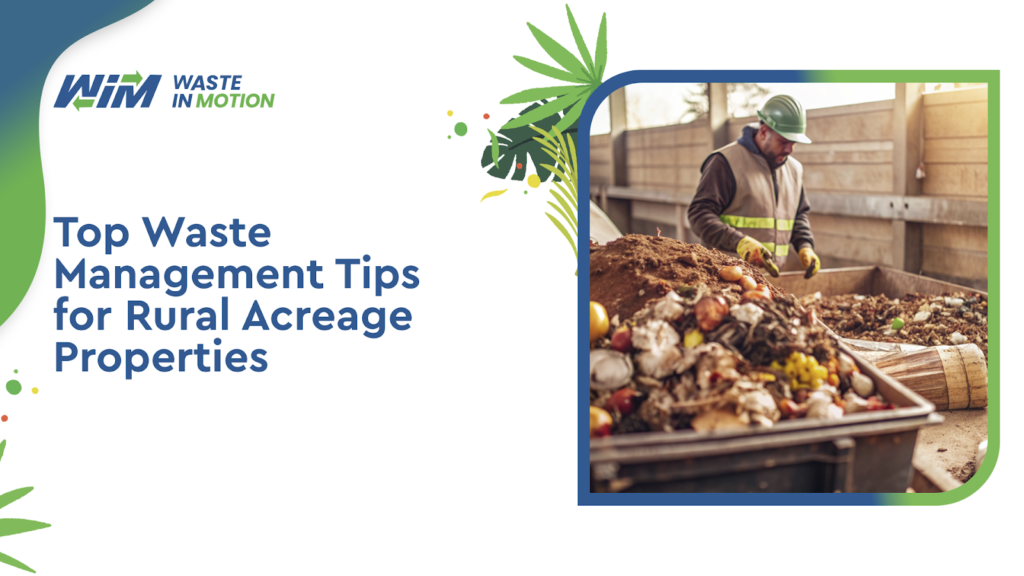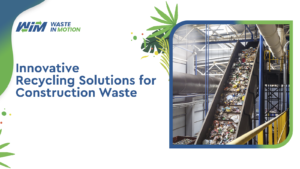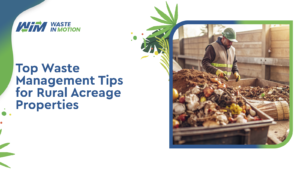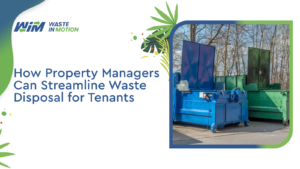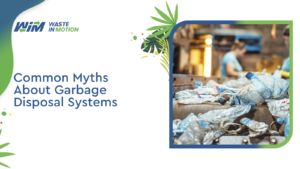Table of Contents
ToggleWhy Waste Management Matters on Rural Properties
Managing waste in rural areas isn’t as simple as dragging a bin to the curb once a week. With larger properties, limited municipal services and unique waste types (think livestock, farm equipment and even well water treatment residue), rural homeowners face a whole different ball game when it comes to keeping things clean and sustainable.
Unlike urban environments where services are centralized, acreage homes often rely on private providers and self-managed systems. Poor waste practices can lead to everything from groundwater contamination to pest problems and even legal trouble if hazardous materials aren’t properly handled.
But the good news? With a bit of planning and the right tools, rural waste management can be both efficient and eco-friendly.
Let’s explore practical, cost-effective strategies to help you manage all types of waste on your rural property—from composting and recycling to specialized dumpster services and innovative solutions like Molok bins.
Understand Your Waste Types: Organic, Household and Hazardous
First things first: not all waste is created equal. The key to smart waste disposal for rural properties is knowing what you’re dealing with. Here’s a quick breakdown:
- Organic Waste: Food scraps, garden clippings and livestock manure. These are perfect candidates for composting if managed correctly.
- Household Waste: Everything from packaging and plastics to broken furniture or old tools. This category often requires sorting for landfill, recycling, or reuse.
- Hazardous Waste: Paints, pesticides, oil filters, batteries and even some cleaning products. These need special storage and disposal methods to avoid contaminating your land or water supply.
Proper categorization helps you avoid mixing materials that could cause environmental harm or create unnecessary landfill loads. It also allows for more effective use of recycling and composting programs tailored for rural setups.
Proper Bin Placement and Scheduling
While urban areas typically receive weekly waste collection, waste bin services for large properties often follow a different rhythm. Depending on your service provider, pickup may be biweekly or even monthly, which makes bin placement and timing crucial.
Here are a few tips:
- Centralize your waste zones: If your property is spread out, set up centralized bin locations (like near your main driveway or barn) to make collection easier for you and your service provider.
- Use animal-proof containers: In rural settings, wildlife like raccoons, coyotes, or bears can turn your trash into a buffet. Opt for secure lids and reinforced bins.
- Establish a routine: Mark collection days clearly and align your cleanup tasks (like yard work or barn maintenance) with those dates to keep waste moving smoothly off-site.
Composting Strategies for Acreage Homes
If there’s one rural waste solution that’s good for your land and your wallet, it’s composting. Not only does it cut down on trash volume, but it turns organic matter into nutrient-rich soil—perfect for gardening, landscaping or pasture improvement.
Some tips for composting in rural homes:
- Choose the right system: Open piles work well for large plots, while enclosed bins are better for keeping smells and critters away near the house.
- Layer it up: Alternate “greens” (food scraps, manure) with “browns” (straw, leaves, shredded paper) for optimal breakdown.
- Keep it turning: Aerate the pile every couple of weeks to speed up decomposition.
- Mind the weather: Cover your pile during rainy seasons to prevent soggy compost and runoff.
If you’re unsure whether to compost or send organics to landfill, check out this guide on composting vs. landfill disposal to see what suits your property best.
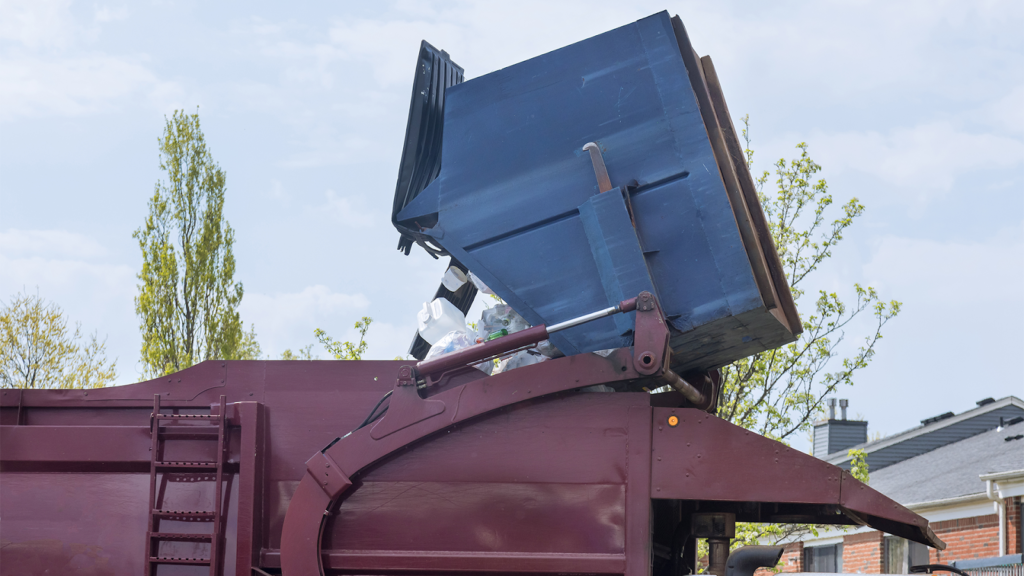
Utilizing Roll-Off and Front-Load Dumpsters
For big cleanups—think barn renovations, spring maintenance, or clearing out dead trees—your standard household bins just won’t cut it. This is where roll-off dumpsters for farms and acreage homes come in.
These large-capacity bins are delivered and picked up by providers on your schedule, making them perfect for:
- Construction debris
- Landscaping waste
- Farm equipment disposal
- Seasonal cleanouts
Not sure which type is right for you? Roll-off dumpsters are great for one-time use and large projects, while front-load dumpsters are better for recurring waste needs (like a working farm or multi-building property). Learn more about the benefits of using roll-off bins here.
Recycling Solutions Tailored for Rural Areas
Rural recycling isn’t always as straightforward as tossing cans in a blue bin. Limited access to recycling centers, fewer pickup services and long distances can all make it a logistical headache. But that doesn’t mean it’s not doable—or worth the effort.
Here’s how to make rural recycling programs work for you:
- Partner with local depots: Some areas have drop-off sites or seasonal collection events for materials like glass, e-waste and batteries.
- Sort and store: Keep labeled bins or bags in a shed or garage to separate recyclables until you have enough for a drop-off run.
- Go digital: Use tools like Recycle Coach or your municipality’s waste calendar app to stay on top of schedules and rules.
Also, don’t underestimate the impact of recycling as part of an eco-friendly waste solution—every can, bottle, or box diverted from landfill reduces strain on the environment. For more structured support, check out Waste in Motion’s recycling programs.
Safe Storage and Disposal of Hazardous Waste
From pesticides and fuel to solvents and expired medications, hazardous waste on rural properties poses unique risks. Not only can it harm wildlife and pollute groundwater, but improper storage can also lead to accidental fires or spills.
Best practices include:
- Designated storage areas: Keep hazardous materials in a locked, ventilated shed or container—away from food supplies and water sources.
- Label and date everything: It’s easy to forget what’s inside an unmarked jug. Clear labeling prevents accidents.
- Don’t dump it: Never pour chemicals into the ground, toilets, or drainage ditches. Instead, contact your regional waste authority or private provider for proper disposal methods.
As a rule of thumb, if it smells strong, comes with a hazard label, or you wouldn’t want it in your well water—it counts as hazardous.
Choosing the Right Waste Management Service Provider
Not all providers are equipped for the demands of acreage homes. When exploring residential waste contracts, look for companies that:
- Offer flexible pickup schedules to suit your property’s needs
- Provide a range of services, from front-load bins to roll-offs
- Have local experience with rural properties and bylaws
- Support eco-conscious practices, like composting and recycling support
Ask about add-ons too—like seasonal bulk pickups or hazardous waste drop-off coordination. Finding the right fit can make your waste routines way less stressful.
How to Reduce Waste at the Source
The most effective way to manage waste? Create less of it in the first place. On rural properties, where space can seem limitless, it’s easy to accumulate stuff without realizing it’s become clutter—or a landfill burden.
Here’s how to reduce household waste on a rural property:
- Buy in bulk but smart: Fewer trips, less packaging. Just be sure to store items properly to avoid spoilage.
- Repair and reuse: Before tossing that wheelbarrow or lawn chair, consider whether it can be fixed or repurposed.
- Limit single-use products: Swap paper towels for rags, and disposable plastics for durable alternatives.
- Plan meals: Leftovers are gold when you’re far from the grocery store—and composting the scraps completes the cycle.
It’s not about perfection. Just small shifts in habits that, over time, make a big difference.

Innovative Waste Solutions: Moloks and Other Technologies
If you’re tired of bins blowing over in prairie winds—or driving waste to the dump every other weekend—innovative options like Molok bins for rural areas could be a game-changer.
What’s a Molok? These are semi-underground waste containers designed to store more waste, reduce odors, and stay out of sight. Thanks to gravity and cooler underground temps, waste compacts naturally, reducing collection frequency and wildlife access.
Advantages of using Moloks:
- Low maintenance and space-saving
- Rodent- and bear-resistant
- Environmentally friendly with better waste segregation options
- Ideal for multi-household or farm setups
Curious about how they work? Read our breakdown on Molok bins and how they work.
Other modern waste tech to consider:
- Solar-powered compactors
- Smart sensors for bin level monitoring
- Compost accelerators for faster soil creation
Legal Considerations and Local Waste Regulations
Before setting up your own private system or bringing in heavy equipment, double-check the waste regulations in your area. Different municipalities—and even conservation zones—can have unique rules around:
- Burning yard or farm waste
- Septic system discharge
- Hazardous waste storage
- Construction debris disposal
You may also need permits for certain waste containers or restrictions on where bins can be placed near property lines or waterways. A quick call to your local municipality or conservation authority can help you avoid fines and keep your waste management efforts on the right side of the law.
Final Thoughts: Building a Sustainable Rural Property
Rural living offers space, independence, and a closer connection to nature—but that also means taking more responsibility for the impact we leave behind. With a proactive approach to waste—from composting and recycling to smart storage and service partnerships—you can create a system that works for your land, your lifestyle, and the planet.
Whether you’re managing a hobby farm or a remote family home, good rural waste management doesn’t have to be complicated. It just takes the right tools, some thoughtful planning, and a commitment to keeping your property—and your surrounding environment—clean and thriving.


